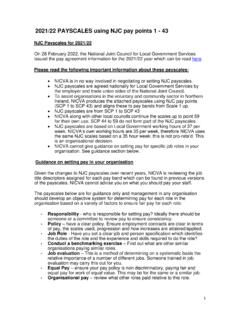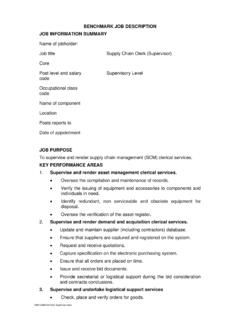Transcription of NICVA PAYSCALES using NJC pay points 6- 49
1 1 NICVA PAYSCALES using NJC pay points 6- 49 Important information about our PAYSCALES In our website article on 6 June 2016, ( ) we confirmed that in May 2016, the NJC PAYSCALES for 1 April 2016 31 March 2018 had been agreed. NJC PAYSCALES are pay points 6 to 49. NICVA is in no way involved in negotiating or setting NJC pay. NJC pay points 6 49 are negotiated nationally for Local Government Services by the employer and trade union sides of the National Joint Council. NICVA develops the salary scales below and extends the upper scale by the same percentage increase (in this case 1%) up to point 65. Please note NJC PAYSCALES are based on Local Government working hours of per week. NICVA working hours are 35 per week, therefore NICVA uses the same NJC scales based on a 35 hour week; this is not pro-rata d. NICVA s salary scales are guidance only and indicate the hours, general duties, skills and level of responsibility which is reflective of each particular scale; it is not an exhaustive or prescriptive list, it is intended as guidance and not to dictate how organisations should pay their staff.
2 The descriptions of types of posts attributed to the scales should not be used in isolation to set pay in your organisation but as part of a wider objective exercise using the guidance below. Guidance on setting pay in your organisation You should put in place an objective system to ensure fair pay for each role: Responsibility - who is responsible for setting pay? Ideally there should be someone or a committee who review pay to ensure consistency. Policy have a clear policy. Ensure employment contracts are clear in terms of pay, the scales used, progression and how increases are attained/applied. Job Role - Have you set a clear job and person specification which identifies the duties of the role and the experience and skills required to do the role? Benchmarking* What are other similar organisations paying similar roles? Job evaluation This is a method of determining on a systematic basis the relative importance of a number of different jobs.
3 Someone trained in job evaluation may carry this out for you. Equal Pay ensure your pay policy is not discriminatory and that there is equal pay for work of equal value. This may be for the same or a similar job. Organisational pay what are other roles paid relative to this role? * NICVA s social economy business Sector Matters can provide a benchmarking service for your organisation. If you wish to find out more please contact Sector Matters on 028 9087 5015. For general HR advice contact NICVA s HR Manager on 028 9087 7777. 2 Spinal Point 01-Jan-15 Scale 01-Apr-16 01-Apr-17 6 13,614 SCALE 1 14,514 15,014 7 13,715 14,615 15,115 8 13,871 14,771 15,246 9 14,075 14,975 15,375 10 14,338 15,238 15,613 11 15,207 15,507 15,807 11 15,207 SCALE 2 15,507 15,807 12 15,523 15,823 16,123 13 15,941 16,191 16,491 14 16,231 SCALE 3 16,481 16,781 15 16,572 16,772 17,072 16 16,969 17,169 17,419 17 17,372 17,547 17,772 18 17,714 SCALE 4 17,891 18,070 19 18,376 18,560 18,746 20 19,048 19,238 19,430 21 19,742 19,939 20,138 22 20,253 SCALE 5 20,456 20,661 23 20,849 21,057 21,268 24 21,530 21,745 21,962 25 22,212 22,434 22,658 26 22,937 SCALE 6 23,166 23,398 27 23,698 23,935 24,174 28 24,472 24,717 24,964 29 25,440 SO 1 25,694 25,951 30 26,293 26,556 26,822 31 27,123 27,394 27,668 32 27,924 SO 2 28,203 28,485 33 28,746 29,033 29,323 34 29,558 29,854 30,153 33 28,746 PO1 29,033 29.
4 323 34 29,558 29,854 30,153 35 30,178 30,480 30,785 36 30,978 31,288 31,601 35 30,178 PO2 30,480 30,785 36 30,978 31,288 31,601 37 31,846 32,164 32,486 38 32,778 33,106 33,437 38 32,778 PO3 33,106 33,437 3 39 33,857 34,196 34,538 40 34,746 35,093 35,444 41 35,662 36,019 36,379 41 35,662 PO4 36,019 36,379 42 36,571 36,937 37,306 43 37,483 37,858 38,237 44 38,405 38,789 39,177 44 38,405 PO5 38,789 39,177 45 39,267 39,660 40,057 46 40,217 40,619 41,025 47 41,140 41,551 41,967 46 40,217 PO6 40,619 41,025 47 41,140 41,551 41,967 48 42,053 42,474 42,899 49 42,957 43,387 43,821 Official NJC pay points stop at point 49. NICVA and some local council scales go up to point 65. These are for guidance only. 49 42,957 PO7 43,387 43,821 50 43,874 44,314 44,757 51 44,794 45,242 45,694 52 45,726 46,183 46,645 52 45,726 PO8 46,183 46,645 53 46,665 47,132 47,603 54 47,646 48,121 48,603 54 47,646 PO9 48,121 48,603 55 48,647 49,133 49,625 56 49,639 50,133 50,635 57 50,623 51,129 51,641 57 50,623 PO10 51,129 51,641 58 51,611 52,127 52,648 59 52,595 53,121 53,652 60 53,573 54,109 54,650 60 53,573 PO11 54,109 54,650 61 54,558 55,104 55,655 62 55,556 56,112 56,673 63 56,553 57,119 57,690 62 55,556 PO12 56,112 56,673 63 56,553 57,119 57,690 64 57,528 58,104 58,685 65 58,522 59,107 59,698 4 Scales Types of Posts 1 2 Administrative/Clerical/Finance/Accounts , Care staff, Receptionist, Caterer, Support staff, Trainee Staff.
5 Regular or routine duties may include clerical duties, or semi-skilled manual work. Junior or trainee roles in non-admin functions. Often work under supervision or direction. 3 4 Secretary, Finance/Admin staff, Care Assistant, Accounts Clerk. A range of clerical and admin tasks. Assists in projects, research and specialist admin or clerical duties. Have specific skills or knowledge such as word-processing or book-keeping, or is more generally involved in supporting other staff with clerical and related services, with minimum supervision. 5 Research/Development/Project Assistant (usually responsible to a Coordinator), Supervisory, Office Manager, PA, Senior administrative staff. Specialist administrative or clerical duties may involve supervision of others. Requires specialist technical input for some clerical positions but is not classified as technical or management. Follows standard procedures, requiring much local or technical knowledge in limited area.
6 6 Development/Education/Publications/Infor mation/Fundraising/Advice Officer, Clerical supervisor/ Training or Care Staff. Professional/technical expertise with either detailed operational expertise in specific areas or broad development skills. May be responsible for operation of a unit within a department or home or assisting or reporting to specialist staff or Manger. May have some supervisory responsibility for less experienced staff. Receives on-the-job training, assisting more senior staff or working on simple projects. Work is assigned with detailed instructions and is subject to close supervision. Guidance should always be made available. Senior Officer 1 Information & Development Officer, Senior Advice Officer, Project Coordinator, Specialist, Professional, Technical Staff (usually applies where there is limited budgetary or staffing responsibility). Senior professional or functional expertise responsible for specific functional specialism and responsibilities.
7 May lead small team or project, performs responsible and varied duties within projects. Work is assigned in terms of detailed objectives and priorities with support and guidance on areas of difficulty. Responsible to Functional Manager or Director. Senior Officer 2 As above but with greater budgetary and staffing responsibilities. Senior professional or functional expertise. Management responsibility for small team or project. May hold the title of Manager. 5 PO1 PO2 Functional/Project Manager, Finance/ Human Resources/IT/Fundraising/Development/Cen tre Manager. Management responsibility for a small function, sub-function or project, reports to Director, Deputy/Assistant Director, Senior Manager (Chief Executive in smaller organisations). Plans, conducts and coordinates work of some complexity and is responsible for staff within a specific business area. Work is assigned in terms of general objectives and priorities but guidance is to be sought on policy or unusually complex problems.
8 Work is reviewed for effectiveness only. PO3 PO4 Function/dept or Unit Head, Senior Function Head with full responsibility for a complete function or activity without membership of a Board/Committee and/or senior management team. Responsible for service delivery and the administration of a function, with some policy information. Has full hands-on responsibility for projects, including long-term and short-term planning with budgetary control and decisions on work programmes. Receives senior manager/executive direction on generic objectives. Work is reviewed only for adherence to policy and general effectiveness. May be a member of a larger operational management team. Responsible to the Chief Executive, Directors. PO5 PO7 Deputy/Assistant Director, Operations Director (could apply to Chief Executive/Executive Director in smaller organisations depending on scale/size/income etc). Head of Department or Functions with membership of the Board/Committee and/or senior management team.
9 Overall responsibility for matters across function, region or defined activity. Formulation and implementation of policy in a major functional area. Receives executive direction on broad corporate policy but may retain discretion on matters of local policy. Has responsibility for overseeing the implementation of corporate decisions and staff across the whole organisation at a strategic rather than operational level. Responsible to the Chief Executive, Board or Management Committee. PO8 Deputy to Chief Executive as well as having own PO5-7 responsibilities. PO9 PO12 Chief Executive, Director, Chief Officer (applicable in larger organisations depending on scale/size/income etc) with considerable staffing and budgetary responsibilities. Primary responsibility for the organisation with overall responsibility for initiating corporate policy and decision-making and applying the board or committee s strategy. Works unsupervised. Responsible to the Board/Committee for the overall performance of the organisation.
10 Has responsibility for staff across the whole organisation at a strategic rather than operational level.











